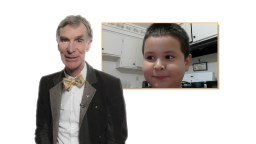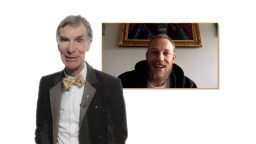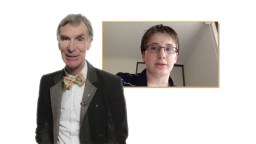It’s Tuesday, which means we’ve got another #tuesdayswithbill question for Bill Nye to answer. The topic this week is the same as last week: black holes. Young Bo asks Bill what would happen if you fell into a black hole. The Science Guy’s answer? Nothing good, that’s for sure.
Bill takes us on a ride around the universe, detailing how physicists and astronomers have determined gravity, light, and other natural occurrences behave in space. He also delves into the topic of wormholes, which some physicists believe could exist.
Bo Bochalmen: If you fall into a black hole, where do you go? You know black holes — they're this big hole in space and a wormhole is different because it goes to a new, you know, a new world, but those don't exist and black holes do.
Bill Nye: Bo, I think that's your name. We couldn't quite make it out, but Bo, greetings. Bill here. You're asking about black holes. That's a great question. The way I like to describe a black hole: It's a star. A black hole is a star. Now, when you and I think of stars we think about the sun, which is giving off all this light. But the other thing about the sun to keep in mind is it has a lot of gravity because it's huge. And everything that has mass, everything that would weigh something here on Earth has gravity. And the exact origin of gravity, where it actually comes from is not fully understood, Bo. If you could figure that out you might change the world. But with that said, a black hole is a star so big, how big is it? It's so big that even light cannot escape it because it has so much gravity.
One of Einstein's discoveries, Albert Einstein's discoveries, was that gravity changes the path of light. It can bend light. It's just not in our everyday experience. Where we're in a room like this or where you are, there's not nearly enough gravity to bend light enough to measure, especially with just human eyes. To measure it, we usually find objects way out in space of known brightness and we see where we think they're going to be and then where they really appear to be and then we infer or figure out that they're not where we thought they were going to be because gravity bent the beam of light. It's amazing. Anyway, so a black hole is a star so massive that not even light can escape from it.
Now, when you get something that big the gravity as you get near it changes and you know this. Like if you're real far away from the light, a light bulb, it's dim. When you walk up really close to it, it gets brighter and brighter and brighter. Well, the same is true of the gravity that a star produces or anything with mass produces. The closer you are to it, the more gravity it has. Satellites in space have less gravity to fight than you and I do here on the surface once they get out there in space, for example. So when you fall into a black hole, Bo, first of all you don't want to do that because the difference in gravity between your feet and your head, just that far is so powerful it would stretch you into really, really thin, like as then as a piece of spaghetti as the saying goes. And Bo, I don't want to shock you; that that would be really bad, but in science fiction, we love that because we can fly around in spaceships and they have sort of science fiction magic powers and we can survive stuff like that in stories.
Now you mention wormholes; wormholes are an idea that people think may exist. And the idea is that you would fall into something with a lot of gravity like a black hole and instead of just getting crushed and killed, you would end up in another part of the universe at a different time. And this is something that physicists say to each other at physics meetings and they're oh yeah, oh yeah different part of the universe different time. Yeah. That's great. Piece of cake. Black hole, wormhole, sure. Sure. But understand, Bo, nobody has ever done this. These are theoretical things. They're important theoretical things because they are consistent or they're part of the bigger story that astronomers and astrophysicists and just scientists in general, they're part of the bigger story of the universe and where you and I came from and what we're all doing here and why the Earth goes around the sun and why the other planets go around the sun and they're all in the same plane almost, except Pluto, which is going — and so it's all part of this big story.
So these are great questions Bo but they really don't have clear succinct answers right now, but perhaps you will be the scientist, the astrophysicist who figures this out for sure. When you have these objects or these theoretical places in space that seem to have so much energy, you just got to wonder if we could harness that energy and do something fantastic with it. Keep asking questions, Bo. This is great. Carry on.






